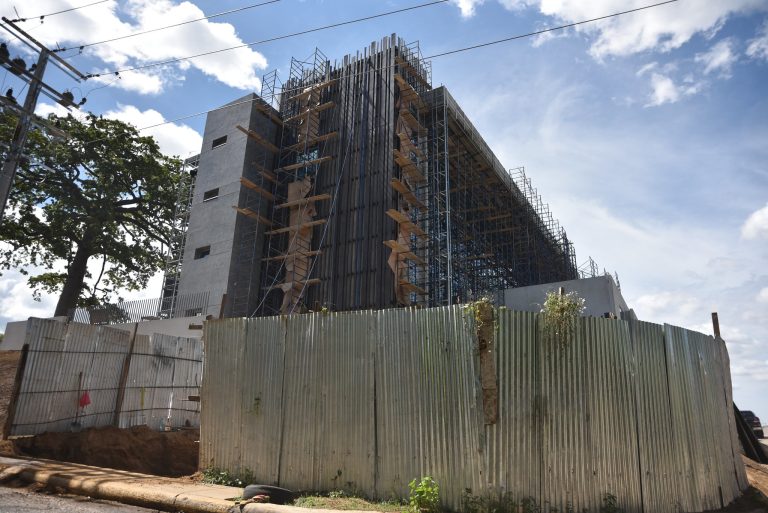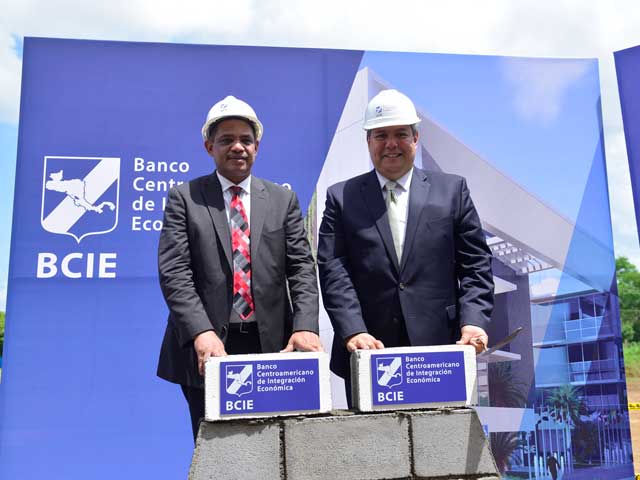25 de noviembre 2021

Children of Exile: The Births “Sowing Hope” in the Camp of Nicaraguan Farmers

PUBLICIDAD 1M
PUBLICIDAD 4D
PUBLICIDAD 5D
President of CABEI seeks reelection; opposition calls on him not to attend and to condition new disbursements

View of the construction of the new CABEI headquarters in Managua. Photo: Confidencial.
The upcoming inauguration of the new headquarters of the Central American Bank of Economic Integration (CABEI), in Managua, which is being built in Plaza Cobirsa at a cost of 16.5 million dollars, is a display of the magnificent relations existing between the executive president of that institution, Dante Mossi, with the head of the Nicaraguan Government, Daniel Ortega.
In response to this close relationship, which transformed CABEI into the main external funder of the Ortega regime, the opposition, the diaspora, and Nicaraguan exiles, sent letters to the Bank’s governors and the foreign ministers, who will meet on November 26 and 27 in Punta Cana, Dominican Republic, denouncing the assistance to the regime, and calling for a boycott of the building inauguration in Managua.
After some multilateral financial organizations closed their sources to Ortega in response to the human rights crisis caused by state repression and the police state since April 2018, CABEI became the main provider of public resources for the Government, to which it approved 2.289 billion dollars in new projects, between January 2017 and June 2021.
According to Otton Solis, the former representative of Costa Rica to that Bank, one of the reasons why the Bank decided to build a new headquarters in Managua is that Mossi (of Honduran nationality) has an “obsession to go to inaugurate it and be in the picture. It is sickening!”, he emphasized.
An expert who knows the ins and outs of the multilaterals, and asked to comment anonymously, agreed with Solis in asserting that the Honduran has an eagerness to make himself known, so he has spent “a bunch of money on buildings; buying land in Honduras without bidding; approved branch offices in Taiwan, Korea, Spain and built this headquarters in Nicaragua,” added Solis, who recently denounced the system of privileges that prevails in the Bank.
In reference to the inauguration of the headquarters in Managua scheduled for December 15, an economist who dissociated himself from CABEI, said that this “is an old project approved a few years ago, which is being implemented until now, but the land had been bought some time ago, and therefore the design as well as the plans also were elaborated a long time ago.”
“Mossi’s visit was in the media when he came to lay the first stone (in October 2019), so it is not something that is being done on purpose ‘at this time.’ It is a project in execution with signed contracts, with construction firms that cannot be stopped without incurring fines or damages to the contracting parties,” he insisted.
Alberto Cortes, the former director for Costa Rica before CABEI between 2015 and 2018 suggested that “although it is a project that comes from way back, it should take into consideration the current context, in which electoral fraud has just happened in Nicaragua, and this inauguration will be used as a form of legitimization of the Government. For this reason, it would be advisable for the Bank not to send representatives to this inauguration”.
Former representative Solis notices another reason to explain the Honduran’s affinity with Ortega: Mossi’s desire to be reelected for five more years, as the Bank’s executive president.
The day the building is inaugurated, the regime’s high officials will be there, along with that of the Bank. That day we will see them partaking, together, as a preamble to what Mossi hopes will happen next, which is to have Nicaragua’s vote to seek his reelection.
“When it comes to electing the president of CABEI, he will seek re-election, and of course, having the vote of Nicaragua is important to him,” because he knows that if the ruling National Party wins the November 28 elections in Honduras, he will have that vote; but if Xiomara Castro wins the elections, he will not have the Honduran vote,” Solis assesses.
It would not be the first time that Nicaragua has supported Mossi. In 2018, while the Bank was looking for the replacement of Nick Rischbieth Gloe to preside over the Bank for five years, Nicaragua nominated economist Francisco Mayorga “but the Board of Directors was not very comfortable with his candidacy,” the source said.

The Minister of Finance and Public Credit of Nicaragua, Iván Acosta, together with CABEI’s executive president, Dante Mossi, during the laying of the first stone of what will be the new headquarters of that Bank in Managua. Photo taken from the Bank’s website.
At that time, the strongest candidate was the Costa Rican Alejandro Rodríguez (Rischbieth’s deputy director), but the lack of support from the Board of Directors and the governor for Costa Rica led several countries to lean towards Mossi as a consensual solution.
Mossi was returning from working in Ghana (Africa), as a World Bank official. His position in the World Bank was not the most solid. When the opportunity to apply to CABEI’s Board of Directors came up, he got the post unexpectedly “after several rounds of internal negotiations, with the support of the Nicaraguan vote, which explains his attitude towards Nicaragua,” the source explained.
“He commented in various forums upon taking office saying that it had been a surprise, but not only for him, but for many beyond the Board, because the previous director, Rischbieth, was also from Honduras,” he added.
A source also points out that “CABEI has always been a good support for the Government of Nicaragua,” regardless of who holds the presidency of the country, recalling that in electoral years, the Bank made a contingent credit line available to the Central Bank of Nicaragua (BCN) to support commercial banks, in case they experience a capital flight, for fear of an electoral victory by Daniel Ortega.
Later, when the 2008 global financial crisis raised concerns about the strength of local financial institutions, CABEI approved a 200 million dollars credit line that it made available to the BCN. “While the others said: “let’s see what we can do,” CABEI was the only one that kept the inflow of resources fairly stable, especially to commercial banks, with lines of credit,” said the source.
These funds remain available, now in the form of a “Credit Program to Support the Liquidity Management of the Central Banks of the Founding Countries of CABEI.”
“The third moment is now,” says the source, recalling that “the Bank needs to place funds, and the countries were not requiring these resources, each one for their own reasons, while Nicaragua’s strategy indicated that it was interested in increasing its portfolio of loans at CABEI, where it lagged: while Nicaragua absorbed close to 13% of the Bank’s portfolio, the other countries were at 20% or more.”
“The Nicaraguan portfolio went from fourth to second place—coincidentally in the period of greatest repression—while Costa Rica, which was the second portfolio, fell to fourth, but there is no logic or comparison,” despite the fact that the Costa Rican economy is three times greater than the Nicaraguan economy, specified the former director before CABEI for Costa Rica, Alberto Cortés.
Opposition organizations of the Nicaraguan diaspora and exiles exhorted the foreign ministers and governors of CABEI from Argentina, Belize, Colombia, Costa Rica, Korea, El Salvador, Spain, Guatemala, Honduras, Mexico, Panama, Dominican Republic, and Taiwan, all members of CABEI’s Board of Governors and Board of Directors, to not participate in the inauguration of the new CABEI building in Managua, scheduled for this December 15.
In addition, they demand that they condition “any disbursement” to Nicaragua on respect for human rights, the release of political prisoners, an end to repression, and compliance with the resolutions of the Organization of American States (OAS), which establish minimum conditions for holding elections.
In the document sent this Monday, the organizations suggest to the CABEI board of directors that they reevaluate “the reputational and financial risk” that means continuing to grant financing to a government regarded as “illegitimate.”
“CABEI has not only maintained but has increased its financing to the Ortega-Murillo regime, becoming the main financial support of the dictatorship,” says the communication signed by the Blue and White National Unity (UNAB), the Civic Alliance for Justice and Democracy, the Peasant Movement, Nicaraguan Democratic Force (FDN), Initiative for Change, Medical Association of Nicaraguan Exile (AMEN), Reflection Group for Former Political Prisoners (GREX) and Nicaraguan Freedom Coalition.
The aforementioned is happening “despite serious human rights violations, including crimes against humanity, which have been widely documented by international organizations,” the letter adds.
The demand from the Nicaraguan opposition suggests the need for CABEI to include a mandatory democratic clause to approve loans or for financing a program.
Ottón Solis assures that such discussion did not exist while he represented Costa Rica. “July 18 was my last day at the Bank, and that clause was not there. I believe that now things are going to change. This is a good moment for the bank to move to disdain the Nicaraguan elections,” he said.
“I do not know if there should be a specific ‘democratic clause,’ but something that goes beyond financial matters. There are already environmental considerations, but there should be something that ensures fulfillment of human rights. It is not that far away,” said the professional who knows the operations of multilateral organizations.
Workers finalize the details of what will be the new CABEI headquarters in Managua. Photo: Confidencial.
In the case of the murder of Berta Caceres, CABEI was the last to pronounce itself. It was after a Dutch bank did it, which was also part of the institutions that were financing the loan to build the dam, but “CABEI does not have the ability to handle that, because the countries are the owners,” he added.
“What will happen if Central America does not recognize the Ortega Government when its new term begins, and then Nicaragua requests a loan? Are they going to recognize the Minister of Finance as governor, the director for Nicaragua, appointed by Ortega, and the loans they present? Let us remember that, when the coup d’état against Manuel Zelaya happened, CABEI did not recognize the subsequent government,” he recalled.
Former director Alberto Cortés said, “development is not possible if it is not based on a society that respects fundamental human rights and the democratic state based on the rule of law. That is why it is necessary for CABEI to establish a democratic clause, so that resources are not channeled to authoritarian Governments and the pattern from 2018 to 2021 is not repeated, when Nicaragua’s financing was significantly increased, ignoring the authoritarian drift and the human rights violations, including crimes against humanity that were taking place in that country.”
This article was originally published in Spanish in Confidencial and translated by Havana Times
Archivado como:
PUBLICIDAD 3M
Periodista nicaragüense, exiliado en Costa Rica. Durante más de veinte años se ha desempeñado en CONFIDENCIAL como periodista de Economía. Antes trabajó en el semanario La Crónica, el diario La Prensa y El Nuevo Diario. Además, ha publicado en el Diario de Hoy, de El Salvador. Ha ganado en dos ocasiones el Premio a la Excelencia en Periodismo Pedro Joaquín Chamorro Cardenal, en Nicaragua.
PUBLICIDAD 3D